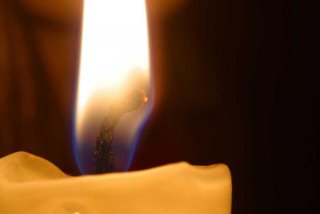I am feeling the need to write this morning. However, there are so many directions I could go. I could write about how the pain is particularly attacking me this morning. I could write about grief and all the loneliness, the feeling that no one understands, and all the hurt and sorrow that goes with this.
Or, I could write about death. This weekend marked 6 months since we lost our little baby boy and our lives were changed forever. I have written much about this, but I have not written much about how I still hurt from time to time over the loss of my two grandparents (one died Fall 04, the other Spring 05). I still dream vivid dreams about them often, where I can speak to them and see and touch them, and I just wake up hurting and missing them so much. I have learned from a friend that "grief resurrects grief," and the loss of my baby has resurrected other grief that is still very near to me, such as the loss of my grandparents. I could even expand my thoughts on death to include death of myself - no, not my physical self, of course, but my inner self and who I used to be. And related, death of my dreams. And the piercing pain and humiliation I feel when I see so many around me living out those dreams (and some with so much ease!).
I could also write about some of the things I've been reading/learning recently. Like, the verse in Isaiah about mounting with wings like eagles, running and not growing weary, walking and not fainting. And about how now, at this point in my life, it is all I can do just to be able to walk without fainting. And how that has to be enough for me, and for others - I can't be expected to fly, or even run, at this point in my life. Or I could write about lament, and how God values and desires our laments as much as He wants our worship and our praise. About how He'd rather us be real, even angry with Him, than not think of Him at all. Or about not attributing bad things to God. That God is the giver of life and He does not kill babies. That He is really and truly actually
for me.
However, the thing that has affected me the most in the last week is from a book I'm reading called "Tracks of a Fellow Struggler." It was written by a pastor (John Claypool) several years ago who lost his ten year old daughter to leukemia, so he knows the heart of grief and the pain of loss. I don't think he experienced quite the "dark night of the soul" that I have, but he is certainly honest and open in his writings. He talks about being presumptuous, about how we can't make judgments about what is happening in our lives just yet. That is, we haven't seen the other side of the story. This really got me thinking, because in the last few years I have become a big proponent of thinking outside the box and not judging something until you know the whole story. Mainly, about being
open. I knew that should carry over into my current life experiences, but when you're hurting so terribly, it's almost impossible to think logically. Anyway, I guess the way I want to feel regarding my life and my pain is that
the jury is still out on this one. I don't know what I will find out in the end - whether God really is good, or whether He is not, after all. Whether there was a purpose, or not. I don't know yet. I'm not able to just say with absolute faith that "Yes, He is still good and still in control", but I want to try not to go the other direction so much either. I'd like to be able to be open, and just wait to see what happens. The pessimist in me says, "Don't hold your breath" for any goodness or healing, but the faint bit of hope still alive keeps me from being in total and complete despair.
Lord, if I wait with openness for You,
will You disappoint me yet again?

